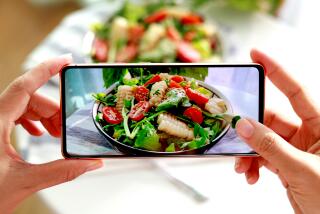Don’t Worry, Be Healthy
- Share via
If you’re concerned about nutrition, you can stop reading. This column is about the “don’t bother me’s,” the food fatalists, the cocky unconverted.
The holiday season can turn any nutritional goody goody into a temporary glutton, but the number of consumers who don’t care about what they eat the entire year is surprisingly large--and possibly growing.
In fact, while interest in nutrition is still high, some pollsters see a leveling off, if not a slight decline, in the public’s concern.
At the very least, there’s still a sizable percentage of the population that isn’t getting the nutrition message and doesn’t want to be bothered by it, either.
An American Dietetic Assn. survey found that more than a third of respondents don’t consider nutrition important and aren’t interested in changing their eating habits. An additional 38% said they “know they should,” but they aren’t doing everything they could to maintain a healthful eating pattern. Only 26% said they consider diet and nutrition very important.
There’s a whole group of people who won’t change their eating habits to improve the quality of their lives until they’re threatened with a health crisis, said Judy Dodd, president-elect of the ADA.
“A significant life event turns a ‘don’t bother me’ into somebody who needs to pay attention,” Dodd said. “There’s no believer better than the person in the cardiac rehab unit.” Robyn Flipse, a consulting nutritionist from Ocean, N.J., counsels patients with uncontrolled diabetes, high cholesterol and obesity. During initial sessions, some of them are “still under the influence of the ‘medical miracle’ way of thinking.”
They have no intention of changing their eating habits, she said. “If there is a drug, pill, potion or elixir that might make their problem go away, that is really what they are seeking.”
In fact, this quick-fix approach was reflected in the ADA’s survey. Respondents didn’t want to change their eating habits because it would mean giving up their favorite foods. Dodd preaches moderation, advising people they don’t have to give up the pleasures of eating to live within healthy guidelines.
At a holiday party, it’s OK to have a piece of chocolate fudge cake, but not a sliver “every time you walk by it,” she said.
Interest in nutrition may be dipping for another reason, however. The NPD Group, a New York-based market research firm that conducts eating-trend surveys, found no increase in the public’s interest in any nutritional issue for the first time this year.
Harry Balzar, vice president of the firm and director of the survey, said food concerns may be taking a back seat in people’s lives when they are worried about things such as “Is our bank going to be open tomorrow? Will I have my job?”
Laura Sims, dean of the College of Human Ecology at the University of Maryland, said that when people are “rocked by basic survival needs,” they may want the comforting, fatty foods they equate with a more simple time in their lives.
Or they may lose interest in nutrition because they worry about having enough to eat.
Aside from the fallout from the recession, some health experts believe there may be a backlash from “nutrition hype.” Nancy Wellman, professor of dietetics and nutrition at Florida State University, charges the media with disseminating too much preliminary data, minutiae and outlandish claims. She said health professionals like to look at 10 or 12 studies before they draw conclusions.
“Now each study that is adding to our knowledge is being written about as though it were the final word. We may be losing some of the public’s enthusiasm and commitment to eating better,” she said. Nonetheless, the nutrition community is in general agreement on how to eat healthier, she added.






